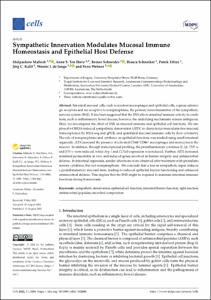Sympathetic Innervation Modulates Mucosal Immune Homeostasis and Epithelial Host Defense

Sympathetic Innervation Modulates Mucosal Immune Homeostasis and Epithelial Host Defense

| dc.contributor.author | Mallesh, Shilpashree | |
| dc.contributor.author | Ten Hove, Anne S. | |
| dc.contributor.author | Schneider, Reiner | |
| dc.contributor.author | Schneiker, Bianca | |
| dc.contributor.author | Efferz, Patrik | |
| dc.contributor.author | Kalff, Jörg C. | |
| dc.contributor.author | de Jonge, Wouter J. | |
| dc.contributor.author | Wehner, Sven | |
| dc.date.accessioned | 2023-03-30T09:56:45Z | |
| dc.date.available | 2023-03-30T09:56:45Z | |
| dc.date.issued | 21.08.2022 | |
| dc.identifier.uri | https://hdl.handle.net/20.500.11811/10746 | |
| dc.description.abstract | Intestinal mucosal cells, such as resident macrophages and epithelial cells, express adrenergic receptors and are receptive to norepinephrine, the primary neurotransmitter of the sympathetic nervous system (SNS). It has been suggested that the SNS affects intestinal immune activity in conditions, such as inflammatory bowel disease; however, the underlying mechanisms remain ambiguous. Here, we investigated the effect of SNS on mucosal immune and epithelial cell functions. We employed 6-OHDA-induced sympathetic denervation (cSTX) to characterize muscularis-free mucosal transcriptomes by RNA-seq and qPCR, and quantified mucosal immune cells by flow cytometry. The role of norepinephrine and cytokines on epithelial functions was studied using small intestinal organoids. cSTX increased the presence of activated CD68+CD86+ macrophages and monocytes in the mucosa. In addition, through transcriptional profiling, the proinflammatory cytokines IL-1b, TNF-a, and IFN-g were induced, while Arg-1 and CD163 expression was reduced. Further, cSTX increased intestinal permeability in vivo and induced genes involved in barrier integrity and antimicrobial defense. In intestinal organoids, similar alterations were observed after treatment with proinflammatory cytokines, but not norepinephrine. We conclude that a loss in sympathetic input induces a proinflammatory mucosal state, leading to reduced epithelial barrier functioning and enhanced antimicrobial defense. This implies that the SNS might be required to maintain intestinal immune functions during homeostasis. | en |
| dc.format.extent | 17 | |
| dc.language.iso | eng | |
| dc.rights | Namensnennung 4.0 International | |
| dc.rights.uri | http://creativecommons.org/licenses/by/4.0/ | |
| dc.subject | sympathetic denervation | |
| dc.subject | epithelial cell function | |
| dc.subject | intestinal barrier function | |
| dc.subject | tight junction | |
| dc.subject | antimicrobial peptides | |
| dc.subject | microbial composition | |
| dc.subject.ddc | 610 Medizin, Gesundheit | |
| dc.title | Sympathetic Innervation Modulates Mucosal Immune Homeostasis and Epithelial Host Defense | |
| dc.type | Wissenschaftlicher Artikel | |
| dc.publisher.name | MDPI | |
| dc.rights.accessRights | openAccess | |
| dcterms.bibliographicCitation.volume | 2022, vol. 11 | |
| dcterms.bibliographicCitation.issue | iss. 16 | |
| dcterms.bibliographicCitation.pagestart | 1 | |
| dcterms.bibliographicCitation.pageend | 17 | |
| dc.relation.doi | https://doi.org/10.3390/cells11162606 | |
| dcterms.bibliographicCitation.journaltitle | Cells | |
| ulbbn.pubtype | Zweitveröffentlichung | |
| dc.version | publishedVersion | |
| ulbbn.sponsorship.oaUnifund | OA-Förderung Universität Bonn |
Dateien zu dieser Ressource
Das Dokument erscheint in:
-
Publikationen (5)




